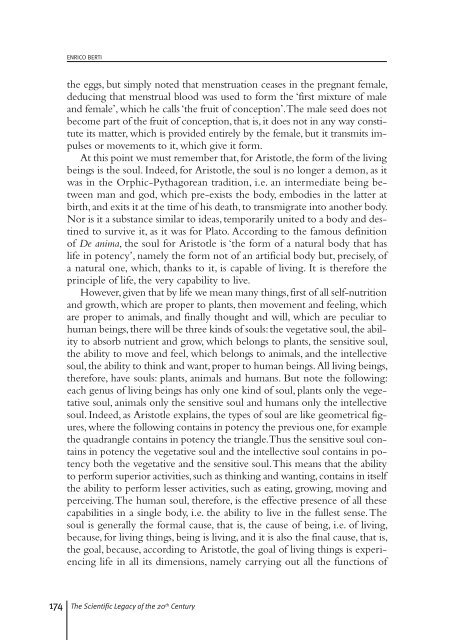PASS Scripta Varia 21 - Pontifical Academy of Sciences
PASS Scripta Varia 21 - Pontifical Academy of Sciences
PASS Scripta Varia 21 - Pontifical Academy of Sciences
Create successful ePaper yourself
Turn your PDF publications into a flip-book with our unique Google optimized e-Paper software.
ENRICO BERTI<br />
the eggs, but simply noted that menstruation ceases in the pregnant female,<br />
deducing that menstrual blood was used to form the ‘first mixture <strong>of</strong> male<br />
and female’, which he calls ‘the fruit <strong>of</strong> conception’. The male seed does not<br />
become part <strong>of</strong> the fruit <strong>of</strong> conception, that is, it does not in any way constitute<br />
its matter, which is provided entirely by the female, but it transmits impulses<br />
or movements to it, which give it form.<br />
At this point we must remember that, for Aristotle, the form <strong>of</strong> the living<br />
beings is the soul. Indeed, for Aristotle, the soul is no longer a demon, as it<br />
was in the Orphic-Pythagorean tradition, i.e. an intermediate being between<br />
man and god, which pre-exists the body, embodies in the latter at<br />
birth, and exits it at the time <strong>of</strong> his death, to transmigrate into another body.<br />
Nor is it a substance similar to ideas, temporarily united to a body and destined<br />
to survive it, as it was for Plato. According to the famous definition<br />
<strong>of</strong> De anima, the soul for Aristotle is ‘the form <strong>of</strong> a natural body that has<br />
life in potency’, namely the form not <strong>of</strong> an artificial body but, precisely, <strong>of</strong><br />
a natural one, which, thanks to it, is capable <strong>of</strong> living. It is therefore the<br />
principle <strong>of</strong> life, the very capability to live.<br />
However, given that by life we mean many things, first <strong>of</strong> all self-nutrition<br />
and growth, which are proper to plants, then movement and feeling, which<br />
are proper to animals, and finally thought and will, which are peculiar to<br />
human beings, there will be three kinds <strong>of</strong> souls: the vegetative soul, the ability<br />
to absorb nutrient and grow, which belongs to plants, the sensitive soul,<br />
the ability to move and feel, which belongs to animals, and the intellective<br />
soul, the ability to think and want, proper to human beings. All living beings,<br />
therefore, have souls: plants, animals and humans. But note the following:<br />
each genus <strong>of</strong> living beings has only one kind <strong>of</strong> soul, plants only the vegetative<br />
soul, animals only the sensitive soul and humans only the intellective<br />
soul. Indeed, as Aristotle explains, the types <strong>of</strong> soul are like geometrical figures,<br />
where the following contains in potency the previous one, for example<br />
the quadrangle contains in potency the triangle. Thus the sensitive soul contains<br />
in potency the vegetative soul and the intellective soul contains in potency<br />
both the vegetative and the sensitive soul. This means that the ability<br />
to perform superior activities, such as thinking and wanting, contains in itself<br />
the ability to perform lesser activities, such as eating, growing, moving and<br />
perceiving. The human soul, therefore, is the effective presence <strong>of</strong> all these<br />
capabilities in a single body, i.e. the ability to live in the fullest sense. The<br />
soul is generally the formal cause, that is, the cause <strong>of</strong> being, i.e. <strong>of</strong> living,<br />
because, for living things, being is living, and it is also the final cause, that is,<br />
the goal, because, according to Aristotle, the goal <strong>of</strong> living things is experiencing<br />
life in all its dimensions, namely carrying out all the functions <strong>of</strong><br />
174<br />
The Scientific Legacy <strong>of</strong> the 20 th Century
















